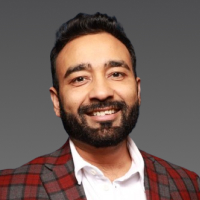The recently concluded Salesforce World Tour Chicago 2023 highlighted the immense potential of data in optimizing health outcomes for Healthcare and Life Science (HCLS) organizations. In this age of hyper-personalization, Salesforce’s Data Cloud is set to drive the next generation of AI-powered HCLS applications. But how can we leverage this power and drive transformative change to improve the quality of care?
Calibrating Strategies for the AI Revolution
To effectively prepare for the new wave of AI-driven healthcare, leaders need to analyze the impact of AI on technology substitution and ecosystem transformation. By understanding how AI can replace existing processes and transform various areas, organizations can strategically adapt and stay ahead of the curve.
Identifying the organizational design challenges associated with ecosystem transformation is another critical step. As healthcare systems become increasingly interconnected, it is important to navigate the complexities that arise from integrating internal and external combinations. Developing strategies to leverage new asymmetries resulting from these combinations can lead to innovative solutions and improved outcomes.
Furthermore, leaders must also adapt to the rise of automation and robotics in healthcare and understand the implications for job roles and skills. This requires a proactive approach to reskilling and upskilling the workforce to ensure a smooth transition into an AI-powered future.
6 Actionable HCLS Use Cases on Data Cloud
At Persistent, we have identified several use cases on Salesforce’s Data Cloud that can significantly benefit Healthcare and Life Sciences organizations. These use cases can be further explored through workshops and proof-of-concepts (POCs) to drive innovation and unlock the full potential of data:
- Patient Outcome Analysis and Hyper-Personalized Care: By leveraging data analytics and AI, healthcare providers can gain valuable insights into patient outcomes and deliver personalized care. This can lead to improved treatment plans, better patient satisfaction, and, ultimately, enhanced population health.
- Population Health Analysis: Data analytics can play a crucial role in analyzing population health trends and identifying areas for intervention. By understanding the underlying factors contributing to health issues, healthcare organizations can implement targeted strategies to improve overall population health.
- Provider Network Optimization: Data-driven insights can help optimize provider networks, ensuring efficient allocation of resources and effective collaboration among healthcare professionals. This can lead to better coordination of care, reduced costs, and improved patient outcomes.
- Fraud Detection and Prevention: Data analytics can be utilized to detect and prevent fraudulent activities in healthcare, such as insurance fraud or prescription fraud. By proactively identifying suspicious patterns and behaviors, organizations can safeguard resources and maintain the integrity of the healthcare system.
- Solving Complex Supply Chain Challenges in CGT/ Rx Order Management: The pharmaceutical industry faces complex supply chain challenges, especially in cell and gene therapy (CGT) and prescription order management. By leveraging data and technology, organizations can streamline these processes, ensuring timely and secure delivery of life-saving medications.
- Secure and Connected Data Ecosystem for Pharma: Creating a secure and connected data ecosystem is crucial for the pharmaceutical industry. By leveraging Salesforce’s Data Cloud, organizations can ensure data privacy, seamless data integration, and effective collaboration across the value chain.
Embracing Innovation with Data Cloud and Persistent
The future of healthcare lies in the effective utilization of data. To harness the immense potential of data in optimizing health outcomes, Healthcare and Life Sciences leaders must calibrate their strategies for the AI revolution, adapt to automation and robotics, and leverage the actionable use cases on Salesforce’s Data Cloud. By embracing data-driven innovation, organizations can unlock new possibilities, improve patient outcomes, and drive the next generation of AI-powered HCLS applications.
With over 18 years of implementation and consulting experience, Persistent has helped leading Healthcare and Life Sciences organizations unleash their business potential with Salesforce Data Cloud. Curious to know more? Contact us today to learn how you can leverage our unparalleled industry and product knowledge to your advantage.
Author’s Profile
Ashish Bhardwaj
Client Partner







